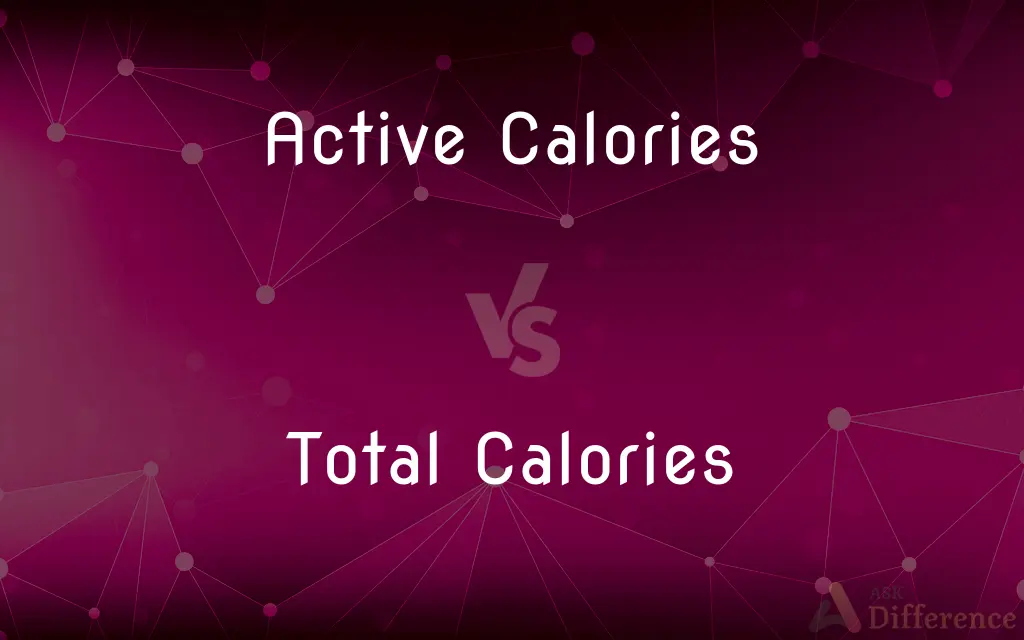Active Calories vs. Total Calories — What's the Difference?
By Tayyaba Rehman — Published on November 16, 2023
Active Calories are burned from physical activity, while Total Calories include all burned calories, both from activity and basic bodily functions.

Difference Between Active Calories and Total Calories
Table of Contents
ADVERTISEMENT
Key Differences
Active Calories represent the energy expended due to any form of physical activity, such as walking, jogging, or working out. These are the additional calories burned on top of what our bodies expend for basic functions. In contrast, Total Calories encompass the entirety of the energy consumed and used by the body in a given period, including those from basic functions.
When someone engages in a workout session, the calories they burn directly from that session are referred to as Active Calories. These are over and above the base caloric burn rate. Total Calories, on the other hand, consider the broader spectrum, which includes the Basal Metabolic Rate (BMR) - the energy required to keep the body functioning at rest.
For individuals tracking their weight or fitness, understanding the distinction between Active Calories and Total Calories is crucial. While Active Calories help measure the direct impact of exercises, Total Calories give an all-encompassing view of the day's energy expenditure.
Fitness trackers and health apps often display both Active Calories and Total Calories. Active Calories give insights into how much additional energy was burned through movement and exercise. Total Calories provide a comprehensive view, accounting for everything from breathing to intense physical training.
In summary, while both Active Calories and Total Calories give insights into energy expenditure, their scope differs. Active Calories focus strictly on the energy from physical activity, while Total Calories look at the whole picture, including basic bodily functions.
ADVERTISEMENT
Comparison Chart
Definition
Calories burned from physical activities.
All calories burned, including basic bodily functions.
Scope
Only physical activity.
Physical activity + resting metabolism.
Significance
Shows effectiveness of exercises.
Indicates overall energy expenditure.
Measurement
Measured during specific activities.
Measured throughout the day.
Influence on Weight Loss
Can increase with more intense activity.
Influenced by both activity level and metabolism.
Compare with Definitions
Active Calories
Energy expended during physical exertion.
Jogging for an hour increased her Active Calories burned for the day.
Total Calories
All-inclusive energy measurement in fitness applications.
The app displayed 2,800 as her Total Calories for the day.
Active Calories
The caloric burn above resting metabolic rate.
She burned 300 Active Calories during her intense workout session.
Total Calories
The entirety of energy consumed and expended in a day.
His Total Calories for the day amounted to 2,500.
Active Calories
The energy measure of the impact of exercises.
Yoga added 150 Active Calories to her daily count.
Total Calories
Comprehensive energy output including even minute activities.
From sleeping to sprinting, her Total Calories captured everything.
Active Calories
Calories tallied separately from basal metabolism in fitness trackers.
His fitness app showed 500 Active Calories after the hike.
Total Calories
The sum of basal metabolic rate and active caloric burn.
With her BMR and workout combined, her Total Calories reached 2,200.
Active Calories
Represent physical activity's direct contribution to caloric expenditure.
To lose weight faster, she focused on increasing her Active Calories.
Total Calories
A broader metric encompassing all forms of caloric burn.
Even without working out, her Total Calories were at 1,800 due to her active job.
Common Curiosities
How do Total Calories differ from Active Calories?
Total Calories include all calories burned in a day, while Active Calories focus on just the physical activities.
How can I track my Active Calories?
Using fitness trackers or health apps can help monitor Active Calories burned.
What are Active Calories?
Active Calories refer to the energy burned due to physical activities.
Can I increase my Active Calories without exercising?
Primarily, Active Calories rise with physical exercise, but active chores or jobs can also boost them.
Can sleep affect Total Calories?
While sleeping burns fewer calories than being active, it still contributes to Total Calories.
Is resting metabolic rate included in Total Calories?
Yes, it forms a significant part of Total Calories.
Why are my Total Calories always higher than my Active Calories?
Because Total Calories also include calories burned by basic bodily functions, not just physical activities.
Which is more important for fitness: Active or Total Calories?
Both are important; Active Calories gauge exercise effectiveness, while Total Calories give an overall energy picture.
Does breathing contribute to Total Calories?
Yes, even basic functions like breathing are part of Total Calories.
How do diet and consumption factor into Active and Total Calories?
While diet contributes to calorie intake, Active and Total Calories refer to energy expenditure.
Why should I monitor my Active Calories?
Tracking Active Calories helps assess the effectiveness of your workouts and activity levels.
Do Total Calories matter for weight maintenance?
Yes, balancing calorie intake with Total Calories expended helps in weight maintenance.
Does walking the dog add to my Active Calories?
Yes, any form of physical movement, including walking the dog, contributes to Active Calories.
If I sit all day, will I have no Active Calories?
You'll have minimal Active Calories, but any small movement or fidgeting contributes to them.
Can I lose weight by increasing my Active Calories?
Increasing Active Calories, while maintaining or reducing calorie intake, can aid in weight loss.
Share Your Discovery

Previous Comparison
Fixtures vs. Fittings
Next Comparison
Gene Mutation vs. Chromosomal MutationAuthor Spotlight
Written by
Tayyaba RehmanTayyaba Rehman is a distinguished writer, currently serving as a primary contributor to askdifference.com. As a researcher in semantics and etymology, Tayyaba's passion for the complexity of languages and their distinctions has found a perfect home on the platform. Tayyaba delves into the intricacies of language, distinguishing between commonly confused words and phrases, thereby providing clarity for readers worldwide.













































